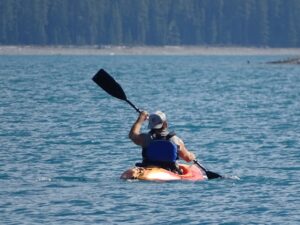 Many people ask, is it possible that can kayaking can make you seasick? The answer is no. You are not going to become so miserable that you have to crawl away from the water.
Many people ask, is it possible that can kayaking can make you seasick? The answer is no. You are not going to become so miserable that you have to crawl away from the water.
The best thing about can kayaking is the fact that it is a very relaxing way to spend your leisure time.
The main reason that people ask is because of the lack of control that is involved with can kayaking. While the water itself is moving in a predictable fashion, the movement of the kayaker is unpredictable. This is the major cause of the problem that most people experience. If you can learn to control the pace of your vessel, you will be able to keep yourself calm.
The biggest problem that can kayaking can make you seasick is the change in the surroundings. You may feel the waves in the distance as you are paddling through the ocean or rushing through a large body of water. If this is the case, you should adjust the boat by turning it on its side and making sure that the blades are pointing down.
Seasickness
Another reason that can kayaking can make you seasick is the increase in pressure. When you are pushing through a wide body of water, you are exerting a lot more force on the vessel than when you are just paddling through a small body of water. If this is the case, you may feel the need to increase the pressure on your vessel. This is not an issue if you are only paddling in one spot, but if you are using a boat for multiple areas of the water, you may need to consult with your instructor to see what they recommend.

Other people are bothered by the noise that can kayak produces. While there is no doubt that this type of vessel is loud, it does not have to be. In order to increase the safety of the area, you may want to place some earplugs in the can. However, if this is not an option, then you should try to invest in a noise-reduction device.
Getting Seasick on a Kayak
One other thing that can kayaking can make you get sick is the water itself. When you are out in the middle of the ocean, you may experience a rapid increase in water pressure and also find yourself floating on your back. This is because of the water rushing in from behind.
Prevent Seasickness
You may think that you are going to float on your back, but you will quickly find out that you do not get comfortable at all. You should make sure that you don’t get too comfortable.
 If you need to, you can get up and walk around the edge of the boat so that you can see the top and bottom. This will give you a better idea of the speed that you are going.
If you need to, you can get up and walk around the edge of the boat so that you can see the top and bottom. This will give you a better idea of the speed that you are going.
Can kayaking is something that you can enjoy a great deal? There is no need for you to become seasick. Just keep an open mind and look for things that you can do to help yourself calm your nerves.
Kayaking
Can kayaking is an experience that you should take advantage of if you are interested in this type of sport. If you can get the time, you should check out some of the places that can kayak. These are some of the most beautiful places in the world and you will have no trouble having a fantastic time if you can get the right equipment.
One of the things that you will have to do to prepare for this activity is to get your body as ready as you possibly can. Make sure that you get a good workout and eat right. The last thing you want to do is get seasick before you even get started. You should get ready and feel as relaxed as possible.
A great way to feel as relaxed as possible is to take a long hot shower before you go out. This helps to reduce any stress that you’re feeling because of the water. You can also use some of the hot water that you can find in the sink to help relax your muscles and help you get ready for the activity. You should also make sure that you are wearing the proper clothing so that you are protected from the water.
Another great thing about kayaking is that you can really have fun while you are out there. It is easy to become tired out after a few hours of this type of activity, but if you have the right equipment, you will be fine.
In Brief
Well, folks, it’s been quite the rollercoaster ride exploring the ins and outs of seasickness while kayaking, ain’t it? Turns out, seasickness – or motion sickness, if you prefer – can indeed rear its ugly head during a paddle session, leaving you feeling queasy as a cat on a hot tin roof. The rocking motion of the kayak, coupled with the inner ear’s delicate dance with your peepers, can lead even the hardiest paddler down a one-way street to Nausea Ville. But fear not, my dear kayakers! There are plenty of ways to help your body acclimate to the motion of the ocean and prevent a bout of seasickness from ruining your day out on the water.
For those prone to feeling the effects of seasickness, it’s a good idea to take it easy – stick to calm waters and avoid the rough and tumble of choppy waves. Don’t forget to drink plenty of H2O and take deep breaths to keep dehydration at bay. If you’re still feeling a tad green around the gills, a rafted tow or contact tow could be your saving grace, allowing you to kayak alongside your buddies without getting your sea legs too wobbly.

Seasickness, also known as motion sickness, can occur while kayaking due to the kayak’s constant motion on the water and can leave you feeling dizzy, nauseous, and ready to toss your cookies. But fear not. There are ways to prevent seasickness while kayaking and help relieve those icky symptoms.
Drinking plenty of water, water can make you feel much better, and using acupressure wristbands and even chewing gum can make a world of difference. If you’re prone to seasickness, it’s a good idea to come prepared with medications that can help, like over-the-counter options.
Pharmaceutical pals like Dramamine, Bonine, and scopolamine might just be the ticket for those in need of a little extra help, but keep in mind they can cause drowsiness. Acupressure wristbands or ginger candy can also offer some relief for that sick-to-your-stomach feeling, so don’t hesitate to bring them along for the ride. After these steps, you’ll start to feel better.
To avoid the risk of feeling sick, it’s important to take breaks and give your body a chance to rest. Back on the water, a way to avoid seasickness is to focus on the horizon and let your eyes see the motion of the water.
In the end, the key to enjoying your kayaking experience is being prepared and knowing your limits. With a few tricks up your sleeve and some good ol’ fashioned determination, you’ll be well on your way to conquering the seas without succumbing to the dreaded mal de mer. So go on, fellow paddlers – grab your kayak, take the bull by the horns, and dive into the wonderful world of sea kayaking without fear of seasickness holding you back!
FAQs
Can kayaking really make you seasick?
You betcha! Kayaking, especially sea kayaking, can also make you seasick due to the rocking motion of the water and the way your eyes and inner ear interpret it. If you’re prone to seasickness to get motion sickness, you might find yourself feeling a bit green around the gills while out on the water.
What are the symptoms of seasickness while kayaking?
Oh boy, it’s a mixed bag! Kayaking makes you seasick, sickness is a common problem. so don’t be afraid! Symptoms of motion sickness can include dizziness, nauseous, vomiting, and feeling downright queasy.
Remember, though, these symptoms can vary from person to person, so it’s essential to know your own body and what to expect.
How can I prevent seasickness on a kayak?
Fear not, my friend! Motion sickness is a common thing, but there are steps to prevent seasickness, like sticking to calm waters, staying hydrated, and taking small sips of water throughout your kayaking trip. Over-the-counter medications and acupressure wristbands can also be helpful for those who need a little extra support.
Are some people more prone to getting seasick while kayaking than others?
Absolutely! Those with a history of motion sickness or who’ve experienced seasickness before are more likely to feel the effects of seasickness while kayaking. But don’t throw in the towel just yet – with proper precautions, even the most susceptible can enjoy a paddle without feeling sick as a dog.
Can rough or choppy waters increase the risk of seasickness while kayaking?
You hit the nail on the head! Rough conditions and choppy waters can indeed make it more likely for a paddler to experience seasickness. So if you’re prone to motion sickness, it’s best to avoid kayaking in these situations or be prepared with preventative measures.
What medications can help with seasickness or motion sickness while kayaking?
There’s a whole slew of options out there! Over-the-counter medications like Dramamine, Bonine, or scopolamine can help keep seasickness at bay. Just keep in mind that some of these meds can cause drowsiness, so use them with caution and always follow the instructions on the label.


